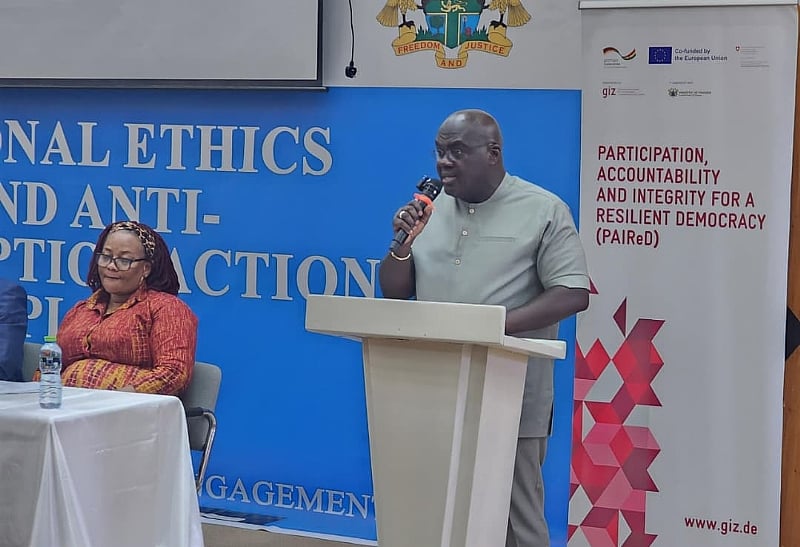Julius Debrah, Chief of Staff, delivered a powerful call to action, urging Ghanaians to embrace ethics and accountability as the bedrock of national progress. He emphasized that a paradigm shift in cultural values, prioritizing integrity and transparency, is crucial for realizing the nation’s developmental goals. Debrah stressed that ethics should not merely exist as policy documents or rhetorical flourishes, but rather must become a living, breathing cultural ethos permeating every facet of Ghanaian life – from governance and business practices to education and daily interactions. He presented the upcoming National Ethics and Anti-Corruption Action Plan (NACAP) 2026-2032 as the blueprint for this ethical transformation, designed to weave integrity and accountability into the very fabric of institutions and society. Recognizing the dedication and contributions of stakeholders throughout the consultative process, Debrah lauded their collective efforts as a testament to the power of shared purpose.
However, Debrah’s address was not without a stark acknowledgment of the challenges ahead. He identified corruption as the single greatest impediment to Ghana’s progress, citing alarming statistics from the Ghana Anti-Corruption Coalition. These figures revealed annual losses due to corruption estimated at US$3 billion – a staggering sum double the country’s foreign direct investment inflows. He elucidated the devastating impact of this financial hemorrhage, depriving citizens of essential services like education, healthcare, infrastructure development, and employment opportunities, while simultaneously eroding public trust and undermining democratic governance. Debrah argued forcefully that prioritizing ethics and anti-corruption is not a peripheral concern but a foundational necessity. Without these core principles, he asserted, even the most ambitious visions for national development are doomed to failure.
While acknowledging the competing demands on public resources, Debrah reframed anti-corruption initiatives as a crucial developmental investment. He painted a vivid picture of the consequences of inaction, highlighting the unattainable nature of critical societal needs – schools, hospitals, roads, and jobs – without addressing the systemic drain of corruption. He linked the success of the envisioned “24-Hour Economy” to the nation’s ability to effectively combat corruption, emphasizing that sustainable economic growth requires a foundation of integrity and transparency. This underscores the need for a long-term perspective, where investments in anti-corruption measures are viewed as crucial for unlocking the nation’s true economic potential.
Mary Awelana Addah, Executive Director of the Ghana Integrity Initiative (GII), echoed Debrah’s sentiments, underscoring the importance of collective responsibility in tackling corruption. She argued that the fight against corruption cannot be solely the government’s burden but requires a concerted effort from all segments of society. Addah advocated for a practical, inclusive, and accountable approach in developing the new NACAP strategy. She stressed that the plan should not be a mere declaration of ideals but must include tangible, measurable indicators that allow citizens to monitor progress and hold relevant parties accountable. This emphasis on transparency and public engagement ensures that the fight against corruption remains grounded in the real-world needs and experiences of Ghanaians.
Addah highlighted the extensive nationwide consultations planned for the development of the NACAP, involving over 400 multi-stakeholder institutions across all regions. This broad-based approach aims to capture the diverse perspectives and priorities of the Ghanaian people, ensuring that the strategy is truly representative and responsive to their needs. Addah emphasized the importance of inclusivity, stating that the fight against corruption is a national conversation that must involve every voice and every community. This commitment to broad participation ensures that the strategy is not only effective but also enjoys widespread public support, crucial for its long-term success. The stakeholder engagement forum brought together representatives from various sectors, including civil society, the private sector, religious bodies, and other key actors in Ghana’s governance and anti-corruption landscape. This diverse assembly underscores the collaborative nature of the fight against corruption and the recognition that success requires a unified front.
The Accra forum served as a crucial platform for dialogue, consensus-building, and the forging of a shared vision for a more ethical and prosperous Ghana. The focus on embedding integrity and accountability into the national culture, coupled with the emphasis on practical, measurable actions and broad-based participation, signifies a significant step towards achieving this vision. The collaborative spirit and the commitment to transparency and accountability demonstrated by the participants offer a promising outlook for the effective implementation of the NACAP 2026-2032 and the realization of a Ghana free from the debilitating effects of corruption.


